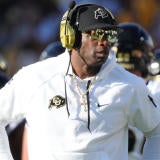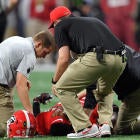As college football considers revealing its deepest medical secrets on a weekly basis during the season, the difficulties involved with assembling a national injury report are just being realized.
Everything, it seems, is on the table.
So much so that releasing no injury information whatsoever may be the "easiest" route for college football, according to Todd Berry, executive director of the American Football Coaches Association.
"I'm not saying that will happen, but there is a need for national consistency," said Berry, also a non-voting member of the NCAA Football Committee, which is being asked to consider national injury reports.
CBS Sports reported earlier this month the Big Ten asked that committee to help develop legislation mandating weekly team injury reports similar to those provided by NFL teams. The Big Ten was reacting to the U.S. Supreme Court's spring decision to allow states to legalize sports gambling.
Since that decision, Delaware and New Jersey have implemented legalized sports gambling. Mississippi could add it before the college football season begins, according to reports.
The Big Ten is advocating injury transparency to avoid gambling sources attempting to get that information surreptitiously.
A top NCAA official said he believes weekly injury reports are a possibility.
"It's happened in professional sports," said Brian Hainline, the NCAA's chief medical officer. "I think the whole gambling issue has brought more immediate concerns to the NCAA that I think we are going to be addressing in real time and soon."
Berry added: "I think there is enough impetus to make it happen [this year]."
Berry spoke with CBS Sports about the possible options on the table. The AFCA will at least have input in any decision as the advocacy organization representing college football coaches.
The NHL model could be in play. The professional hockey league is vague in reporting injuries, designating either "upper body" or "lower body" afflictions.
Of course, privacy concerns could lead to the aforementioned default setting: no release of any information.
To release injury details, college sports would somehow need to address federal law. Specifically, the Family Educational Rights Privacy Act (FERPA) and the Health Insurance Portability and Accountability Act (HIPAA) could be interpreted as roadblocks, ultimately keeping injury information private.
"If you're giving out more [injury] information, there will be speculation that the coach is gambling," Berry said.
Currently, injury information is made available on a coach-by-coach basis. Some cite those privacy acts. Others call it a courtesy to the media.
In general, coaches in are averse to releasing injury information. For the last seven years, ACC coaches issued injury reports for conference games only. Two days before any game, they were compelled to list injured players probable, questionable, doubtful or out.
The reports were only a "guideline." There was no enforcement. The practice was ended after last season.
The NFL has mandated its teams release weekly injury reports since 1946. That practice started over concerns regarding game-fixing.
Hainline believes college football can find a way toward releasing detailed injury reports. From 1992 to 2007, Hainline was chief medical officer of tennis' U.S. Open. He was named the first chief medical officer of the United States Tennis Association in 2008. Hainline joined the NCAA in 2013.
"I understand the depth of the scandals" as it relates to gambling in tennis, Hainline said. "Tennis was undergoing this massive, massive investigation by the medical integrity unit. It led to a radical restructuring of professional tennis as we know it."
Pro tennis ignored widespread evidence of tennis match-fixing, according to 2016 media reports.
The London-based Tennis Integrity Unit is an anti-corruption organization policing professional tennis against gambling scandals.
That history is one of the reasons the Big Ten is attempting to be proactive.
"There should be some sort of [college football injury] statement," Hainline said. "I think right now everyone is trying to come to terms how to get those statements out and how to do it in a methodologically sound way. We can't just be silent."





















